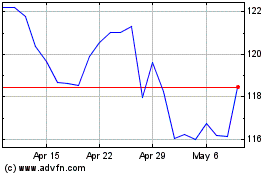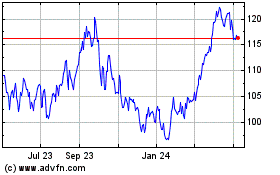Sabic Profit Lifted by Falling Costs -- Update
January 19 2017 - 7:11AM
Dow Jones News
By Ahmed Al Omran
RIYADH-Saudi Basic Industries Corp. (2010.SA), one of the
world's largest petrochemical companies, said Thursday it expects
growth in major global economies to support the industry in 2017
after posting its first quarterly rise in profit in over two
years.
The company, better known as Sabic, said volatility in the oil
market remains a challenge but expects crude prices to average
around $55 per barrel this year following the Organization of the
Petroleum Exporting Countries' deal late last year to cut
production.
Chief Executive Yousef a l-Benyan also dismissed concerns over
Sabic's business in the U.S. following the election of Donald
Trump, who has threatened to impose heavy import tariffs on foreign
companies.
"We are considered local manufacturers in the American market.
Additionally, we believe the American market is a promising market
for petrochemicals," Mr. Benyan told reporters at the company's
headquarters in Riyadh.
The CEO added that Sabic plans to continue to expand in the U.S.
following the announcement last year that the company is
considering a joint-venture with Exxon Mobil Corp. (XOM) to build a
major new petrochemical complex on the U.S. Gulf Coast.
Sabic posted a 48% jump in net profit to 4.55 billion Saudi
riyals ($1.21 billion) for the three-month period ending Dec. 31,
up from 3.08 billion riyals in the same period last year, on lower
selling costs and expenses.
The result, its first three-month rise in profit in the last 10
quarters, still missed most analysts' expectations. Riyadh-based
Albilad Capital expected Sabic to post a net profit of 5.37 billion
riyals, while analysts at NCB Capital had expected 5.33 billion
riyals in earnings.
"We believe lower than expected gross margin and income from
associates were the key reasons behind the deviation," an analyst
at NCB Capital said.
The Saudi Arabian petrochemical giant, which is 70%
government-owned, said it made sales worth 34.03 billion riyals in
the fourth quarter, slightly down from 34.16 billion riyals a year
earlier.
Its full-year net profit was down 4.6% year-on-year to 17.91
billion riyals due to lower average product sales prices and an
additional impairment charge, Sabic said.
Sabic's earnings are linked to prices of commodities and global
economic growth, as many of its products like plastics and
fertilizers are sold and used across the world. A diversified
portfolio and global presence can help buffer the company against
the sharp drop in oil prices since the middle of 2014.
Mr. Benyan said Sabic analysed different scenarios for oil
prices this year but the company's focus remains on improving
reliability in their plants while hoping for stable energy
markets.
"If there is stability in prices regardless of the price, though
of course it is better if it is higher, then results of the
companies can be positive and they can control manufacturing
operations and also the impact on products prices," he said.
The company has worked to reduce costs by merging different
units and aimed for better use of its feedstock after the Saudi
government cut subsidies for utilities such as electricity, water
and fuel to cope with the impact of cheap oil.
Sabic is the biggest listed entity in the Middle East. Its
performance is closely monitored by investors, especially after the
kingdom allowed foreign investors to begin purchasing stocks
directly in its market in 2015.
Write to Ahmed Al Omran at ahmed.alomran@wsj.com
(END) Dow Jones Newswires
January 19, 2017 06:56 ET (11:56 GMT)
Copyright (c) 2017 Dow Jones & Company, Inc.
Exxon Mobil (NYSE:XOM)
Historical Stock Chart
From Mar 2024 to Apr 2024

Exxon Mobil (NYSE:XOM)
Historical Stock Chart
From Apr 2023 to Apr 2024
